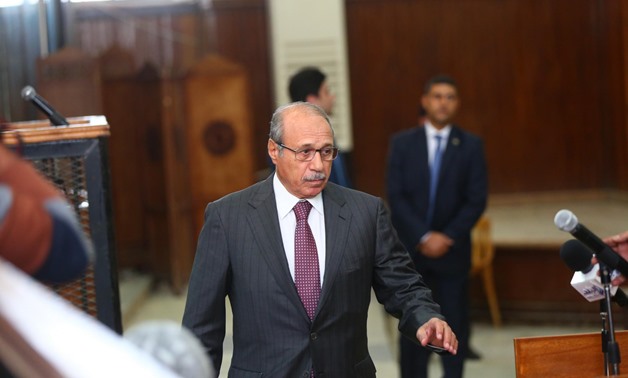
Former Minister of Interior Habib al-Adly entering Cairo Criminal Court to testify in the lawsuit known as “the illegal crossing of eastern borders,” October 28, 2018 - Egypt Today/Hussein Talal
CAIRO - 29 October 2018: Former Minister of Interior Habib al-Adly testified before the Cairo Criminal Court on Oct.28 in the retrial of former President Mohamed Morsi and 28 other defendants affiliated with the outlawed Muslim Brotherhood in the lawsuit known as “the illegal crossing of eastern borders.”
The incident occurred in 2011 amid the January 25 Revolution as foreign militants illegally entered Sinai and raided Wadi Al-Natroun prison to free the brotherhood’s prisoners, including Morsi who called the Qatari Al-Jazeera TV channel via satellite phone once he got out on January 28, 2011, the day known as “Fury Friday”.

Judge Mohamed Sherine Fahmy presiding over a retrial session of the lawsuit known as “the illegal crossing of eastern borders,” October 28, 2018 - Egypt Today/Hussein Talal
“If I knew that January 25 protests were a foreign conspiracy and that they included foreign elements, I would order the use of arms,” Adly said, elaborating that late Chief of General Intelligence Omar Suleiman affirmed that between 60 to 70 foreigners participated in the demonstrations that took place on January 28, 2011.
The former minister added that he would never call January 25 a revolution. He asserted that militants affiliated with Hamas, the Muslim Brotherhood, Hezbollah, the Iranian Revolutionary Guard Corps (IRGC) and Bedouins riding 30 4x4 cars burgled the prisons. In parallel to the militants’ attack on the establishment with arms and loaders, the brotherhood prisoners caused chaos in order to distract the security forces as they knew of the timing, Adly stated.
Adly said that those militants also attacked the State Security Office (now the National Security Office) in Sinai as well as the police departments and the public facilities in Arish committing massacres in the city to distract the Border Guard Forces and facilitate their infiltration through the borders.
The former minister also said the outlawed brotherhood forged passports for the IRGC militants to facilitate their entry and enable them to participate in the January 25 protests. Adly said that Khaled Mashaal, the leader of Hamas at the time, mediated the coordination between the Muslim Brotherhood and the IRGC.
“I received information that the brotherhood’s Hazem Farouk and Khaled Mashaal held a meeting in Beirut in 2009 that was attended by Katatny (speaker of the House of Representatives in 2011-2012), Beltagy, and other brotherhood leaders,” Adly said.
“A phone call between Morsi and Ahmed Abdel Aaty (the election campaign manager of Morsi), who was in Turkey, was detected. The brotherhood denies it participated in the protests on January 28, 2011, although phone calls proving their participation were detected. Phone calls between the Supreme Guide Office and leaders across governorates were also detected. That’s why I issued a decree to exile 32 brotherhood leaders before January 28, 2011,” Adly stated.
The Public Prosecution’s arraignment include plotting with Hamas Political Office, Hezbollah, and leaders of the International Organization of the Muslim Brotherhood to plunge Egypt in turmoil in order to fail the Egyptian state and its institutions, and training militants affiliated with the IRGC to carry out violent military operations within the country’s borders and break into the Egyptian prisons.

The defense of Mohamed Morsi and 28 others affiliated with the outlawed Muslim Brotherhood in the lawsuit known as “the illegal crossing of eastern borders,” October 28, 2018 - Egypt Today/Hussein Talal
The Court of Cassation suspended in January the Cairo Criminal Court’s death sentences against Mohamed Morsi, former Supreme Guide of the Muslim Brotherhood Mohamed Badie, his deputy Rashad Bayoumi, his bureau’s member Mohie Hamed, Saad al-Katatny, Essam al-Erian, and life sentences against 20 other defendants, ordering a retrial.



Comments
Leave a Comment